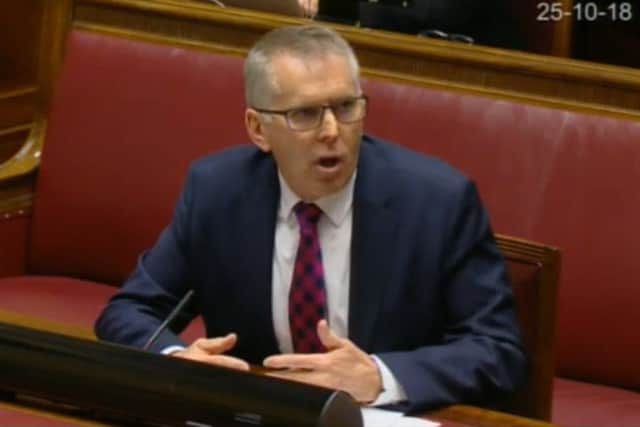RHI Inquiry: David Sterling says sorry '“ and pledges to fully implement panel's recommendations
and live on Freeview channel 276
David Sterling, the head of the civil service, told Sir Patrick Coghlin’s public inquiry that there was a need for “leadership” within the civil service to address multiple failures across the organisation.
The inquiry’s 110 days of evidence have been devastating for the reputation of the Northern Ireland Civil Service, exposing failures across the organisation and a culture in which civil servants acquiesced in breaking their own rules in order to please Stormont ministers.
Advertisement
Hide AdAdvertisement
Hide AdOn the inquiry’s penultimate day of evidence, Mr Sterling said: “I have to admit that multiple mistakes, multiple failings were made and that we should have done better.


“As permanent secretary in the Department of Finance, when I attended the Public Accounts Committee two years ago I offered an apology on behalf of my time at the Department for Enterprise, Trade and Investment.
“But I think it’s only right as head of the service I should recognise that the extent of the failings have been such that I should offer again, without hesitation, a profound and unequivocal apology for the mistakes that have been made.
“And I want to take this opportunity to make a promise on behalf of the NICS board that we will do everything possible to make sure that nothing like this ever happens again.”
Advertisement
Hide AdAdvertisement
Hide AdMr Sterling also gave a personal assurance that any action recommended by the inquiry would be implemented “quickly and fairly”.
Inquiry chairman Sir Patrick Coghlin interjected to sharply remind Stormont’s top mandarin that he would have to deal with “the fact that this is not the first time” that these mistakes or omissions have happened, with a series of damning Audit Office reports having previously exposed some of the practices which led to the RHI scandal, including the failure to keep records and a refusal to believe whistle-blowers.
After outlining past failures to deliver on assurances that “lessons have been learnt”, Sir Patrick told Mr Sterling: “So we do need to be convinced that third time round something’s going to be effective.”
Mr Sterling said he agreed and acknowledged that there had been a repeat of behaviour from past scandals which ought to have ended, and went on to set out a series of bureaucratic steps which he said had been taken or were being worked on in an attempt to prevent a recurrence.
Advertisement
Hide AdAdvertisement
Hide AdHowever, he acknowledged that past reports commented not on an absence of rules but on a culture where those rules were not adhered to – something he said had to change.
He endorsed the comments of the Comptroller and Auditor General that civil servants should treat public money as if it was their own.
However, he insisted that the public should not view every civil servant through the prism of RHI, highlighting that thousands of civil servants work with diligence and integrity – and have done so in particularly trying circumstances for more than a year and a half in the absence of any form of ministerial direction.
Mr Sterling went on to give a second apology to civil servants for the fact that he had played a role in the scandal – in that he was the most senior official in Arlene Foster’s department at the time when the scheme was set up without cost controls.
Advertisement
Hide AdAdvertisement
Hide AdAlthough Mr Sterling was not personally responsible for drawing up the scheme, he accepted responsibility as the most senior civil servant within the department at the time of that key failure.
He said that as someone involved in the scheme he wanted to “offer an apology to the rest of the civil service who no doubt are having to deal with the fact that the credibility of the organisation as a whole has been called into question – unfairly in my view”.
However, Mr Sterling accepted some people will question what they are hearing: “I can understand that people may be cynical or sceptical about what I am saying – but I would want to give you assurance that we are very serious about this.”